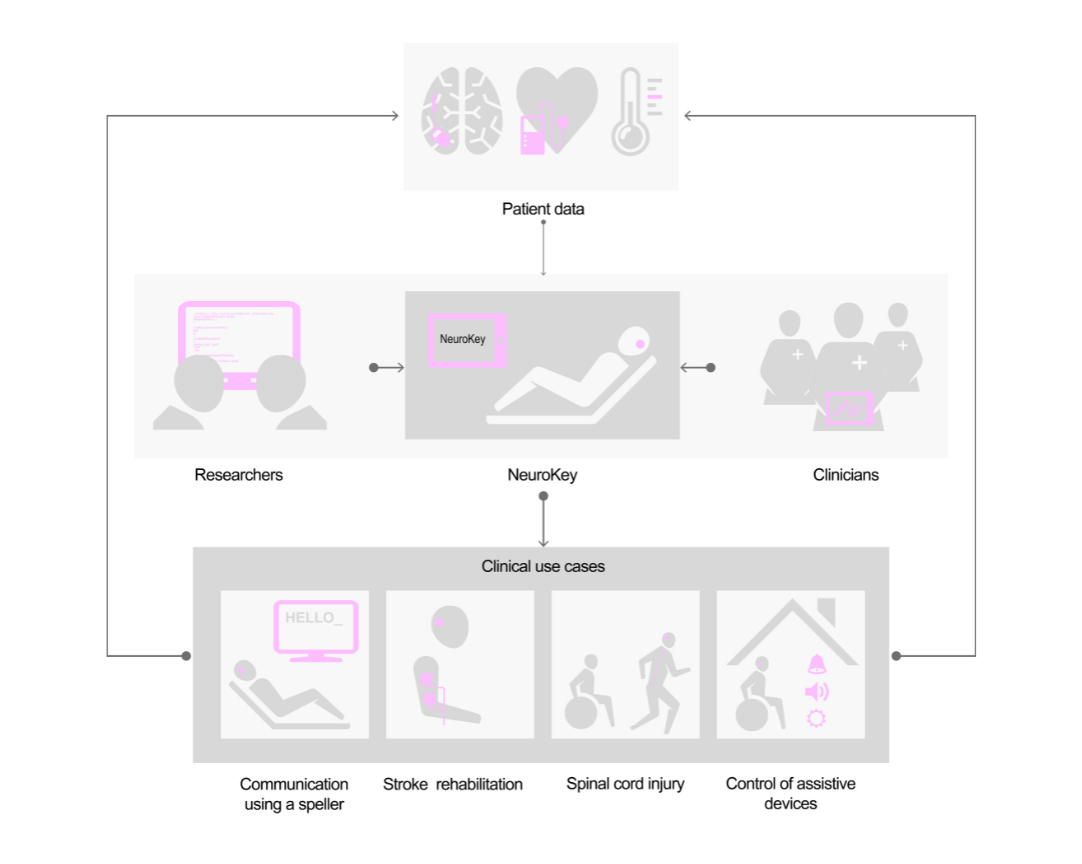NeuroKey™
Real-time neural signal processing platform

Goal | Restoring communication for paralyzed patients
Status | Completed
Timeframe | 2021 – 2022
Area of Research | Bain-computer-interface technology
Partners | UNIGE
Lead | David Ibáñez Soria
Evolution | Part of the ABILITY project

A software platform to graphically author, execute and monitor brain-computer interface (BCI) workflows for research and clinical applications
NeuroKey is software that combines and processes data from ABILITY and other data acquisition devices in real time. It extracts information and decodes brain signals to generate commands to control assistive devices that can help restore mobility, communication, and independence for people with paralysis or other nervous system disorders.

NeuroKey aims to be a complete and single solution for neural interface research and clinical use. NeuroKey is optimized for the analysis of large data streams from high channel count implantable Brain-Computer Interfaces (BCIs) but can also be integrated with multiple other acquisition devices to process data such as EEG, EMG, hemodynamic or audio signals among others.
Neurokey is based on a modular software architecture of individual processing blocks that can be flexibly interconnected to tailor the design of complex algorithms for the processing of physiological data including neural activity. These individual processing blocks are called processors, and can be used to interface hardware devices, for signal processing, feature extraction and classification including single neuron activation analysis, spectral analysis, connectivity and local field potentials. NeuroKey has an Application Programming Interface (API) to enable development of custom-made apps, and run experiments. The API allows full pipeline control and secure real-time access to large streams of data at every processor and can hence deliver results to third party applications.

NeuroKey features
Medical grade: NeuroKey is being developed as medical software to allow fast prototyping and deployment of BCI applications in accordance with the international standard IEC 62304.
Flexibility: The processing blocks are customizable so they can be easily integrated into BCI applications.
Modularity: NeuroKey offers a convenient graphical block diagramming tool for developing custom real-time data processing pipelines.
Data Integration: NeuroKey can interface with multiple commercial or custom-made data acquisition devices and sources in a simultaneous, scalable, and synchronized way.
Developers API: Secure, controlled access to all data generated within processing pipelines at every block and in real-time.

The NeuroKey software is suitable for use in the clinic or at home so has the potential to give people with paralysis a new level of independence.
- Communication – Restore communication in completely locked-in patients by combining diverse neural and physiological data sources and decoding them in real-time to enable use of a speller.
- Stroke rehabilitation – Gather movement intention data to help reinforce neural pathways during stroke therapy.
- Recovery from spinal cord injury – Help restore leg movement following injury by processing multiple data streams and generating spinal cord stimulation commands.
- Control assistive devices in the home – Process data from multiple sources and provide command signals to activate assistive devices that help with daily activities, build independence, and improve safety and well-being at home.
- Example of a clinical use case: NeuroKey was used in KIAP clinical case to enable communication in a patient with CLIS
- Example of a pre-clinical use case: NeuroKey is being used to drive closed-loop spinal cord stimulation for hemodynamic control in a DARPA supported project